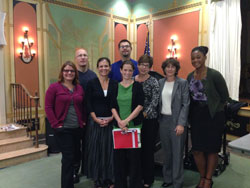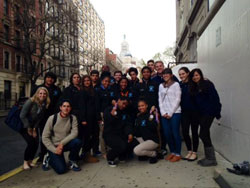The prevalence of sexual violence on college campuses and ways to prevent sexually violent behavior was discussed by a crowd of University students and faculty who attended the “Confronting Campus Rape Culture Discussion and Workshop” event in Wilson Hall on Wednesday, Oct. 1.
“The crisis of sexual assault is so great,” said Dr. Johanna Foster, an assistant professor of political science and sociology instructor.
“According to the recent task force report released by the White House, one in five women in college have been sexually assaulted,” Foster said.
Foster explained that women and girls of all races are affected the most by sexual violence and that the victims are often aquatinted with their assailants. “Mary Koss’s research on campus date rape and acquaintance rape found that nearly 44 percent of all women surveyed, experienced some form of sexual activity when they did not want to,” Foster added.
Nicole Smith, President of the Gender Studies Club, said that sexual violence is present at the University, “I believe there is a problem with sexual assault here as well, though I am proud that the University has taken these issues to heart and has attempted to work on them,” said Smith.
“A staggering 27 percent of men would rape a woman if they thought they could get away with it,” said Smith. “We need intensive sex education and scrutiny on campus. Men are the primary perpetrators of rape and violence against women, and we need education to support this idea that no means no.”
Dr. Nancy Mezey, Dean of the School of Humanities and Social Sciences, stresses the need for education on the issue. “We need to get people to start thinking about sexual assault as a social problem not as an individual problem,” said Mezey.
Most people think and assume that rape is a result of one individual’s actions. “The common perspective is to look at this major problem as simply about the random bad behavior of a few dangerous individuals,” said Foster.
“The main goal of the event was to begin a conversation about campus sexual violence that looks at the much larger social and cultural forces that make certain social spaces much more dangerous for both women, and also some men students,” added Foster.
“I believe our culture prides itself on extreme forms of manhood and being a ‘true man’ and that culture basically incorporates the idea that women are sexual objects and not human beings in their own right,” said Smith.
Dr. Chris Hirschler, Advising Coordinator for the Department of Health and Physical Education, commented, “We have to really think about what it means to be a man. If your friend objectifies a women, call him out on it.”
During the workshop students were given a chance to express their feelings on sexual violence and ways to prevent it. “The language you use makes a difference. There is a difference between the terms ‘Frat Bro’ and ‘Fraternity Man,'” explained Monica Santos, a junior political science major.
“Sexual assault and violence are absolutely preventable. There is nothing inevitable about gender violence,” said Foster.
“The extent of sexual assault and rape in a society is directly related to the level of gender inequality and to the extent to which the society believes that men and women are radically different from each other,” said Foster. “Solutions will not be individual, it won’t happen unless you stand up and do something.”
Smith said it is crucial for survivors to know that rape is not their fault. “You should speak up; many women are terrified of retaliation from their rapist,” said Smith. “I would encourage any survivor to report their assault and most importantly report their rapist.”
Dr. Nina Anderson, Title IX Coordinator at the University, explained that there are countless resources to help students with such situations. The Monmouth University Police Department (MUPD), Counseling and Psychological Services, Health Center, and the Office of Student Services are all there to help any student in a compromising sexual assault situation. “Understand there are confidential places where you can talk and please don’t let fear keep you from getting resources,” Anderson said.
Foster felt that the event was a good way to start the conversation of rape culture on college campuses. “I hope students came away from the event with confidence that their faculty and administrators are working hard to keep them safe,” said Foster.
“I hope students will have the motivation to work with one another to take collective action as this problem is not an individual one, but a social one, and it will not be solved with individual solutions,” said Foster.
PHOTO COURTESY of Danielle Schipani




